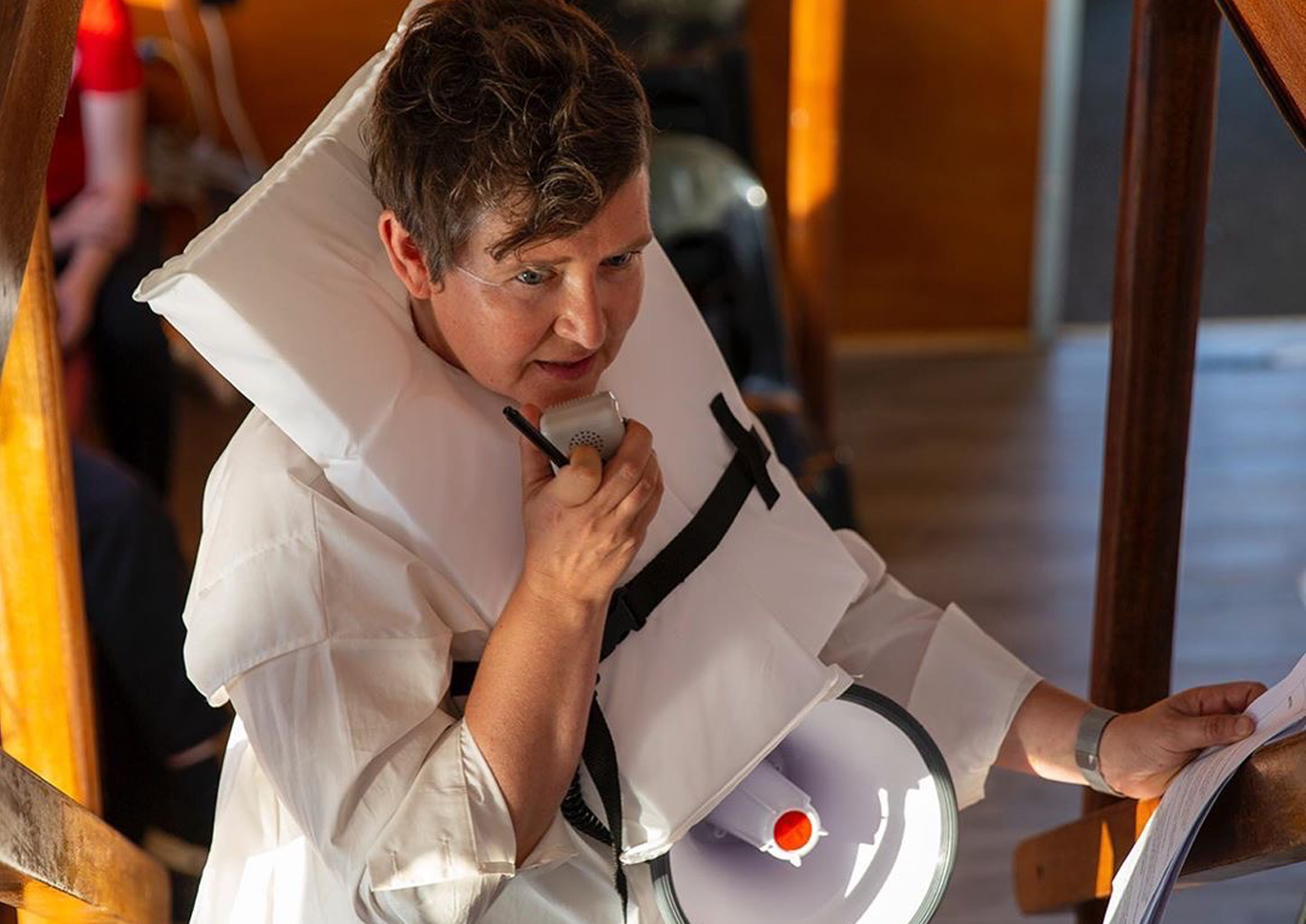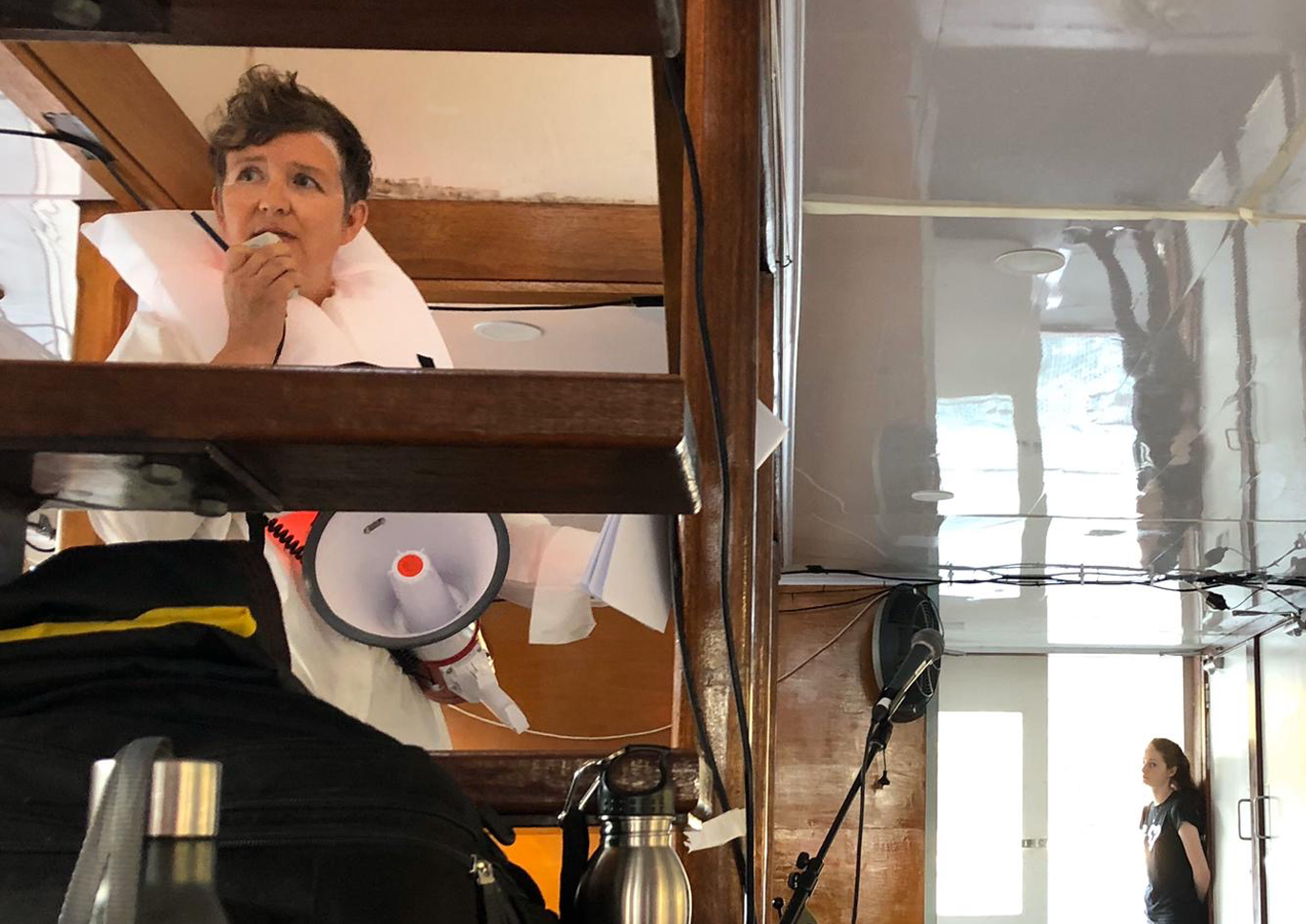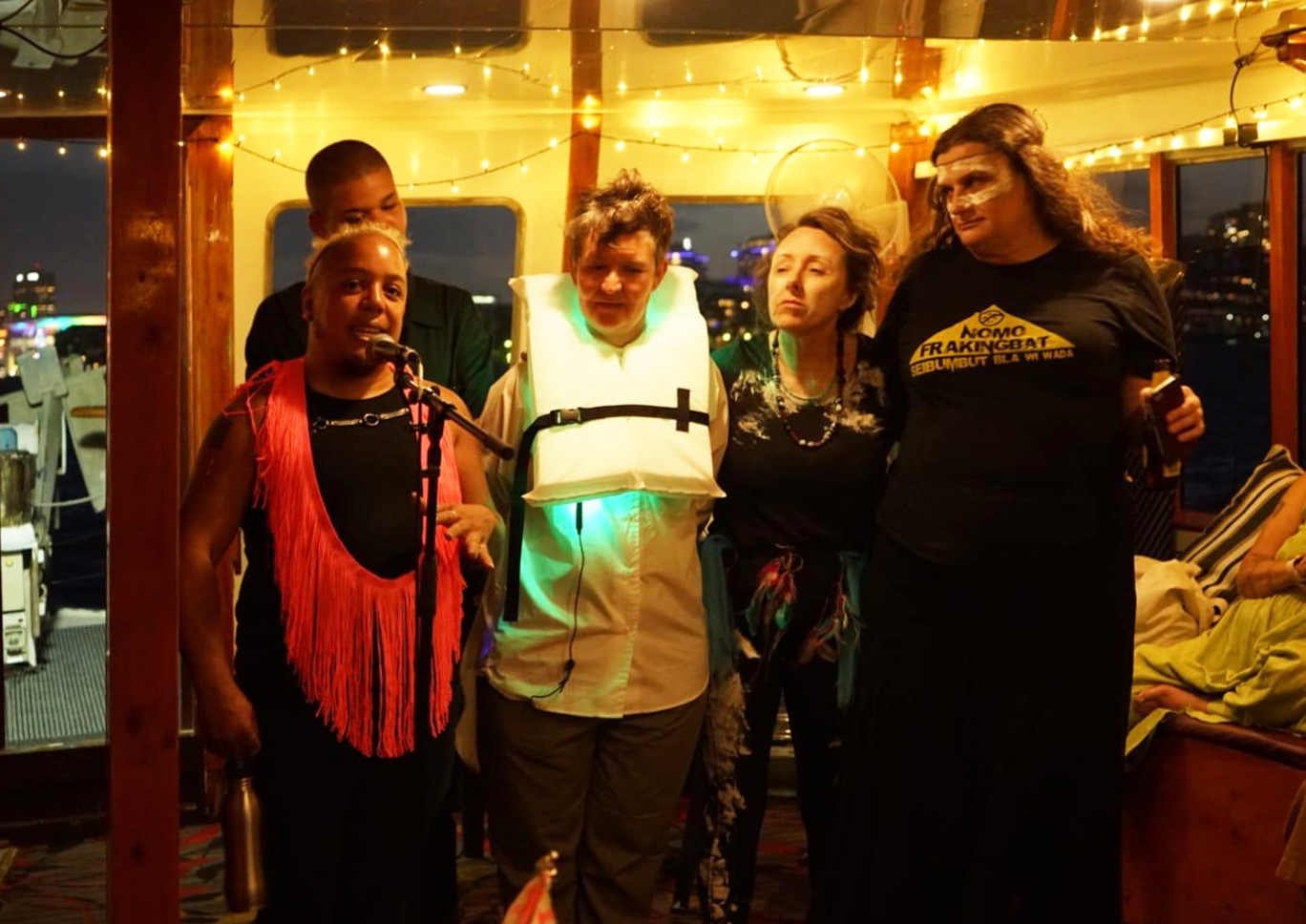SLEEPWALKING INTO EXTINCTION
Collapse//Survive, collaborative fabric banner - Claire G. Coleman, Venessa Possum, Jen Rae and Syrus Marcus Ware. Photo credit: Vanessa Kwan
2130 SLEEPWALKING INTO EXTINCTION (2020)
Performance Lecture for The Future is Floating aboard the Mari Nawi, Sydney Festival, 22 January 2020.
2130 Sleepwalking into Extinction
Original script©
Written and performed by Jen Rae aboard the Mari Nawi for The Future is Floating on 22 January 2020
On the top deck of the Mari Nawi a crash sound breaks the silence and the speaker appears from the stairs. She dusts herself off and takes the microphone of the megaphone. There is some static. She clears her throat and begins.
Can you hear me?
Clears throat
Can you hear me now?
She pauses
I’m sorry to interrupt your party. My name is Ellis Yves Rae, daughter of Hannah Rae, granddaughter of the songstress Vivien. My people come from a remote community called Love, in the far north east of what was once called Saskatchewan, Canada. Population 672 as of today the 22nd of January 2130. My great grandmothers fled Australia in 2030, arriving at the port of Vancouver along with hundreds of thousands of other climate refugees from this continent and the Pacific Islands. Cities were on fire or simply washed away. Droughts, famines, disease, water wars and food shortages…ecological and social break down…
…but, I’m not here to tell you a story of ruin…
She pauses
besides, much of the records were lost in the great Internet collapse of 2042, so much of what I am about to tell you is from our family’s oral history and from the contents a time capsule my great grandmother buried 100 years ago, recently unearthed. Her instructions were to come to you today to wake you before you sleepwalk into extinction.
She pauses
You have now crossed the threshold of ‘everything change’, as world leaders spin their neo-liberalist agendas, incessantly extracting and depleting natural resources at record speed and precision. Everything around you is in breakdown. Your livelihoods, systems of governance, economic and social relations, EVEN your visions of the future and your future ancestors’ future are becoming overwhelmingly compromised.
She shouts in exclamation
Unprecedented they say! A climate emergency, they declare!
Most of it was all rhetoric tangled in bureaucracy. Some people in Love still call it the Anthropocene or the Age of Stupid (if we’re feeling like a laugh), but most of us refer to it as the Great Collapse of 2030.
Some said it came too quickly…but what about the decades of warnings?
The first global convention on climate change was held on the 23rd of February 1979. The second in 1990. 37 other yearly gatherings followed: Kyoto, Bonn, Montreal, Copenhagen, Doha, Paris, Madrid, Shanghai, Auckland…Report after report. Campaign after campaign. The science of global warming and its impact on the life systems of this planet didn’t change much over the 40+ years. It only got better and stronger, thanks to the efforts of hundreds of scientists producing what is likely the most rigorous and comprehensive peer-reviewed research documents in human history.
Yet…despite the abundance of critical literature on the subject, you never had the political willpower or shifts in human systems to safeguard a liveable future for humans and non-humans.
Climate change was always an engagement and communication crisis more than an environmental one.
We don’t have time to get into the politics and sinister forces that undermined a systemic global response…and you can’t mourn all the things you coulda’, shoulda’, woulda’ done if time rewound.
She pauses and shakes her head in regret/disbelief
So many alarms…such future blindness, sleepwalking towards extinction.
Sharply she says
But now I need you to focus.
She directs her gaze to different audience members with each question
What were the images that shocked you or the statistics that started to make sense?
What were the stories or events that made you or the rest of the world take notice?
Who did you believe when you were inundated with so many conflicting stories in your media feeds?
When did the real panic, grief, anger, fear set in?
Take a moment to think…when did you truly understand the magnitude of climate change and what it would mean to you, your loved ones, your communities…your country?
What are you feeling right now?
As she speaks a tray of paper is being passed around the audience
Please take one of the slips of paper being passed around that best describes the way you’re feeling and hold it tightly in your hand, until I tell you otherwise. The words being passed around are Elizabeth Kubler Ross’ 5 stages of grief. Denial, anger, depression, bargaining and acceptance.
You might feel like you’re vacillate between them...but just pick one. What I can tell you from the future is that the grief won’t go away. You’re in it for the long haul, so you better get used to it. Harness it. Compartmentalise it, so you can go on. I still lose my shit when I think of everything lost, but I can’t let myself get lost with it.
With urgency in her voice she says
What I am about to tell you is not to frighten you into flight, fight or paralysis. It is the story of collapse.
Hold tight to your piece of paper and maybe the hand of someone beside you. This is your final warning call from the future.
Some believe that climate change was a threat to ethnic, national and global security, propped up by false ideologies and covert agendas. It is likely true…evidence supports it. Civilisations have collapsed before – think of the Rapa Nui, Roman Empire, Sumerians, Assyrians, Babylonians, Incas, Mayans, Tang and Song Empires and Great Zimbabwe to name a few. There are two drivers that led to 19 out of 23 advanced historical civilisation to collapse (not including yours).
Tell me if this sounds familiar:
1. Unsustainable growth driven by unsustainable agriculture leading to significant ecological strain; and,
2. Substantial economic stratification between the rich and poor.
Add to this: increased hostility between neighbours and trading partners.
According to evidence found in my great-grandmother’s time capsule, the trajectory of collapse comes quickly:
‘Commoners’ will feel the blows greater in the initial stages of collapse. Once the ‘Elites’ start to notice
(because their services are disrupted), then it’s too late. Those who can escape, do, while the rest perish.
So where do you begin to change your course, if what you are witnessing and experiencing is history repeating itself?
I’m going to play an audio clip found in the time capsule. It is a recording before the collapse. The tag on the recording device says it was recorded by Jen Rae with Marco Cher-Gibard in 2028, in Melbourne when the city was evacuated. Let me warn you, the alarms may be distressing between the 3-6 minute mark. It is hard to imagine what it must have been like for the 5 million residents forced to leave their homes.
PLAY Evacuate - 9 minutes of audio
Pause before she says
My family in Love didn’t want me to play you the recording as they thought it might be triggering. But, that’s not my intention. I played it because I’m afraid that everyone is too distracted, too polite, too stressed and too busy to have the really hard conversations now. Let me tell you…the conversations are only going to get harder and they can’t be postponed.
Your children can’t do all of the heavy lifting and in times of disaster. Protect your children, elders and women first. They are your seeds and lifelines.
Time is not on your side.
She shrugs her shoulders
What are you prepared to give up? Fight for? Live with?
She pauses and takes a deep breath
Let’s talk more about time.
The Intergovernmental Panel on Climate Change in 2018 said you have 12 years to curb runaway climate change. We now know they were being conservative. The challenges facing your uncertain future are complex and overwhelming. Some catastrophic losses are inevitable.
Twelve years! With two almost down and ten to go...depending on how the revolution unfolds
To get a sense of what 12 years looks like, consider your social media and mobile phones. Facebook was released to the public in late 2006 and Twitter followed shortly after. Similarly, the Apple iPhone was released in 2007.
We don’t use this technology any more…
She speaks with in a questioning tone and slowly in direct clarity to the audience
But.. if you consider how your social media and mobile technology transformed global culture and communications in less than 12 years, then it could be reasonable to argue (and, moderately hopeful) that you have the capacity to transform other human systems just as quickly.
It took all the tools, knowledges and experiences to bring you to this brink. It will take the same to steer this boat towards survival rather than collapse.
Pauses
There was once this academic named Richard Eckersley that said you basically have three responses to fears of the apocalypse: nihilism, fundamentalism or activism.
Nihilism is indifference or negativity. If the world is going to end, then I might as well have a good time.
The Mari Nawi approaches the Prime Minister of Australia’s residence in Sydney Harbour without the audience knowing. She says:
As we circle near Kirribilli House, the residence of Scott Morrison, Prime Minister of Australia, I invite you to stand up and turn your back to the house, as a unified silent protest, while I explain fundamentalist thinking in this context.
The audience all stands turning their back to Kirribili House as the Mari Nawi passes.
Fundamentalism – whether religious or secular can provide a false sense of security or help to temper anxieties. Fundamentalism also breeds intolerance and generates simplistic solutions to complex problems. This thinking also denies personal responsibility for inaction.
Isabelle Stengers and Naomi Klein warned about the rise in climate barbarism in the form of white supremacy and extreme right wing conservativism as a means of protecting profits and concealing inherent racism. And, Australia is teetering on becoming an authoritarian regime as climate protests and bush fires increase in numbers and intensity.
Human rights begin to wash away as the sea levels rise and storms surge. You are already seeing it with attacks on protestors and the silencing of journalists. Laws sanction cruelty in off-shore detention camps and city police officers are given semi-automatic weapons as a deterrent for “terrorism”, while corporate media fuel divisions and the elite play ‘survival of the richest’ – when will the protestor become a terrorist and the journalist a criminal?
Now is not the time to become complacent.
She pauses
One defeats the fanatic or those seeding self-interest by having difficult conversations often with those outside your bubble. Lean into the tensions and let questions do the heavy lifting. Use critique to bolster each other’s growth, not to tear each other down.
Cultivate dissensus – you don’t have to agree on everything…but find the common threads that unite.
She pauses and directs the audience
You can sit, but don’t back down.
Pause
Activist thinking is not maladaptive like the others. It can ward off feelings of inertia and apathy and connect people with a shared value or purpose. It often works from a bottom-up approach and comes from the margins in empowering and hopeful ways that are outwardly focused and desiring change.
Speaking directly to the audience landing eye contact
Every one of you has a community of influence (be it on the street, your running group, gallery network, workplace or family).
You have a voice, a march and a pen! Revolutions weren’t won overnight by one.
Once the many realise they outnumber the few…you will generate groundswell.
The next few years are critical and as you build momentum, you will see and feel greater climate related impacts. Don’t be defeated.
21st century philosopher Nassim Taleb wrote a great deal about risk, probability and volatility – like how you might navigate some of the impending shocks and stressors related to climate impacts.
First, the concept of the BLACK SWAN – before Australia was colonised, the old world believed that all swans were white. Myths, stories and fables were built around this belief. Taleb cautions us to think critically about our ultimate truths (our black swans) – the things we believe in without questioning as they may reveal our ultimate vulnerabilities.
Like: the myth of progress, job security, the government will act in the best interest of the people, technology will save us, etc.
To the audience: What are your black swans?
Taleb also wrote about the ‘antifragile’ mindset. You might be hearing a lot about ‘resilience’ – another term that lost its meaning in the climate crisis. Resilience is malleable like an elastic band that stretches and then returns to its original form. However, if the elastic is subject to heat, cold, air, etc, the elastic band deteriorates. In the climate emergency, you will be stretched.
Taleb’s concept of the ‘antifragile’ takes resilience a step further. Instead of the elastic disintegrating, it becomes stronger in volatility. With each shock or stressor, it redesigns or reconfigures itself to become stronger – like hydra or rhizomes that self-heal and regrow lost limbs.
With urgency in her voice
You have less than 11 years and time is ticking. Where do you begin?
Pause
In the essay ‘Reconciling in the Apocalypse’, Metis writer Erica Violet Lee writes that when faced with grief and loss about the past, you move forward by re-imagining a world that should have been prior to colonial disruption. Relation by relation, you breathe life into creation, reconciliation and collective action.
Pause
I asked you at the beginning to take a moment to consider when you truly understood the magnitude of climate change and what it would mean to you?
Are you prepared to cross some personal and professional thresholds to engage in the efforts to divert climate breakdown? What are you prepared to give up? Fight for? Live with?
Now is the time to self-audit your capacities and capabilities and ask yourself and those in your communities of influence:
Can you imagine what survival and thriving through the climate crisis might look like for you and the generations after?
Who’s voices are being silenced and need amplification?
What are the skills and knowledges on the thresholds of being lost that might be needed in the future?
What can I contribute? What do I need to learn/unlearn?
Let me tell you…disasters are a terrible time to learn new skills.
In the seminal book Radical Homemakers, 14th edition, Shannon Hayes talks about the 3RRRS to overcoming the credo of individualism and achieving greater interdependence with community and social justice: Renouncing, Reclaiming and Rebuilding.
The first act is to renounce the thing you want to change. The second is to reclaim the skills and knowledges to achieve that change. And, the third is to Rebuild – or engage in reconnecting with the community.
If you consider disaster preparedness or living in the climate emergency…
Renouncing - I am going to prepare my household to be more self-sufficient in case of a disaster.
Reclaiming - What are the skills and knowledges that I need to learn to become more self-sufficient (e.g. purchasing a generator, how to harvest drinking water, grow and preserve foods, identify edible weeds etc.)
Most people stop here...like the survivalist or preppers. This can become exhausting and unfulfilling in the long haul, hence the third act: Rebuilding.
She pauses and then takes focus to direct the audience
That piece of paper you have in your hand. When you’re ready to take the next step, cast it into the ocean. The paper is environmentally safe disposable paper and will dissolve.
I’m going to leave you now and return to Love.
Love not Fear.
She leaves.
Relevant link: – The future is floating



